As always, this ballooned to be a bit too big for a throwaway Facebook comment… In fact, I’m almost embarrassed by the scale of this… so… anyway…
The more I think about it, the more I realise that the complaint “but The Force Awakens was basically the same story as Star Wars” is a steaming load of bullshit. The alleged similarities are really superficial ones, rather than deep connections as claimed, while the demands for “something new” are nothing but vague sentiments from people who seem to have largely missed the point.
It should go without saying, but don’t read below this line if you haven’t seen it.
Luke, don’t forget to ask Uncle Owen if the droid can speak cherry-picking
To see why “it’s basically the same story” is bullshit, consider:
Our plucky, young, and entirely capable protagonist has their planet attacked by the Big Bad. They’re eventually captured by him, and then there’s torture, escape… and eventually the hero unites with a bunch of rebels to blow up the Big Bad’s base. Yes, The Force Awakens is “basically the same story” as Flash Gordon minus the Queen soundtrack.
The hero has heard stories, rumours and generally feels ill at ease with the world. Suddenly, they’re confronted with a wise sage who says it’s all true, and whisks them away into a new world if they so choose it. Faced with a Big Bad that vastly outclasses them, the hero embraces their chosen-one-ness and uses it to defeat the Big Bad through their special, chosen-one power. Yep, The Force Awakens is “basically the same story” as The Matrix. And probably Jesus.
Big Bad wields a huge broadsword and the plucky, reluctant hero has to fight them after the briefest of training by an elder… oh, wait, that’s Highlander! And, like, every other sword-fighting film ever made.
Yay! We can all cherry pick tropes. Prizes all around!

The Meta-narrative is strong with this one
You have to be aware that these can’t be criticisms of the film in itself – that experience begins at the opening crawl and ends when the credits roll. You’re there for a self-contained experience and anything you get from that is valid regardless of what happens outside. This is why in Harry S. Plinkett’s infamous prequels reviews, he makes the point that “it’s explained in the novelisation” is a bullshit response. You take the movie as it is.
To make a comparison with another film (and yes, arguably even one in the same franchise and continuity) you need to step outside of the film as a story. This means you’re making a metatextural comment – not on the film as a film/story, but on it’s nature as a product to be consumed by the audience, which is something different entirely. Mind, if you’re not comfortable with that subtle difference, just leave. Close the window/tab. You’ll get literally none of the rest of this.
But you can make such comparisons. This is fine. This is valid. In fact, please do. So long as you’re willing to admit and acknowledge that’s what you’re doing – we can compare The Hunger Games with Battle Royale all day, but the existence of one doesn’t alter the content of the other in any way. Once you realise this, it’s obvious that The Force Awakens “basically the same story” as a lot of other things – you just picked the one released in 1977 due to prior priming. Understandable priming, yes, expected priming, yes – but still nothing but priming. Cf. Does Avatar rip off the Smurfs, Fern Gully, Pocahontas, Titanic or Aliens? (answer: ‘whichever one you watched most recently’).
And if that’s all you’re doing – some metatextural trope-spotting, fine. Really, it’s fine. It’s just not a great criticism of the film as a self-contained entity – if it was, you would never watch something twice. Repetitive similarities with previous experiences don’t affect your ability to enjoy it or derive any pleasure from this one instance. Hell, straight vanilla couples do this all the time.
I find your lack of lack of internal consistency disturbing
But what about within the film, no ‘meta’ required?
For that you need to ask if the story is self-consistent. And yes, yes it is.
Is it a bigger Death Star? Sure it is.
But that complaint is like saying that the guys who sank the Yamato were blatantly ripping off the guys who sank the Bismarck. Star Wars is a universe where those things exist and exist to be destroyed repeatedly. Cf. Return of the Jedi and, if you really want, the Expanded Universe / Legends where the super weapons start at the Sun Crusher and gradually get more ridiculous from there.
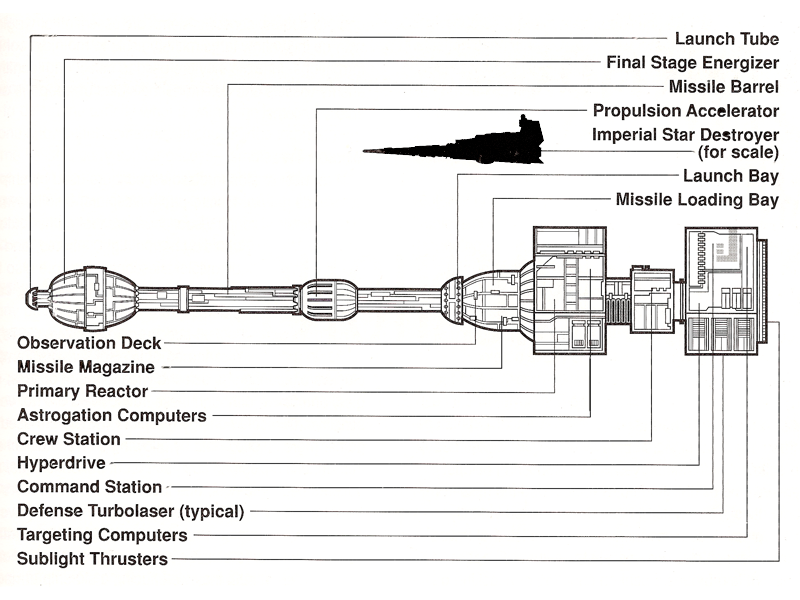
Okay, the picture is of the Galaxy Gun, because the Sun Crusher looks gorram ridiculous. But you see my point? “Bigger Death Star” pretty much writes itself when you ask “so, what would come next if this were really happening?”
In fact, go to Wookieepedia article on the Star Wars super weapons and you’ll find a quote from EU Han Solo hanging the mother of all lampshades on the subject. Even the characters in the EU remark “boy, we sure do blow up a lot of these things”! So, yeah, it’s consistent for another super weapon to be part of The Force Awakens.
As for the droids you’re looking for, that’s perfectly internally consistent for the Star Wars universe, too. This is a world where paper is a long-lost technology for Reasons, remember. So, droids basically take the place of writing down scraps of messages. Consider; how many real-world spy thrillers chase after pen drives and SD cards these days? If your pen drive can move of its own accord and seek help, you’d hide your stuff in it, too. So the MacGuffin in The Force Awakens is perfectly consistent within the fictional Star Wars universe; and as consistent as a spy thriller in our real world featuring a laptop or a hard drive.
Ah, the openings! Yes, both films open with the Evil Guys, lead by the Big Bad, attacking somewhere with stormtroopers! Good spot, but again, internal consistency says this should happen quite frequently (bad guys being bad, whatever next!), while the narrative perspective says this is a good point to start the film. This is something that Attack of the Clones and The Phantom Menace could have learned from, because holy hell do they have some boring openings.
Even The Empire Strikes Back opens with the rebels getting their arses handed to them by the Empire – “basically the same”, right? Actually, given that it’s bad guys setting fire to a village, that’s Robin Hood: Men in Tights it’s ripping off! I’m just waiting for the X-Wing pilots to start a musical number next to the toilets.
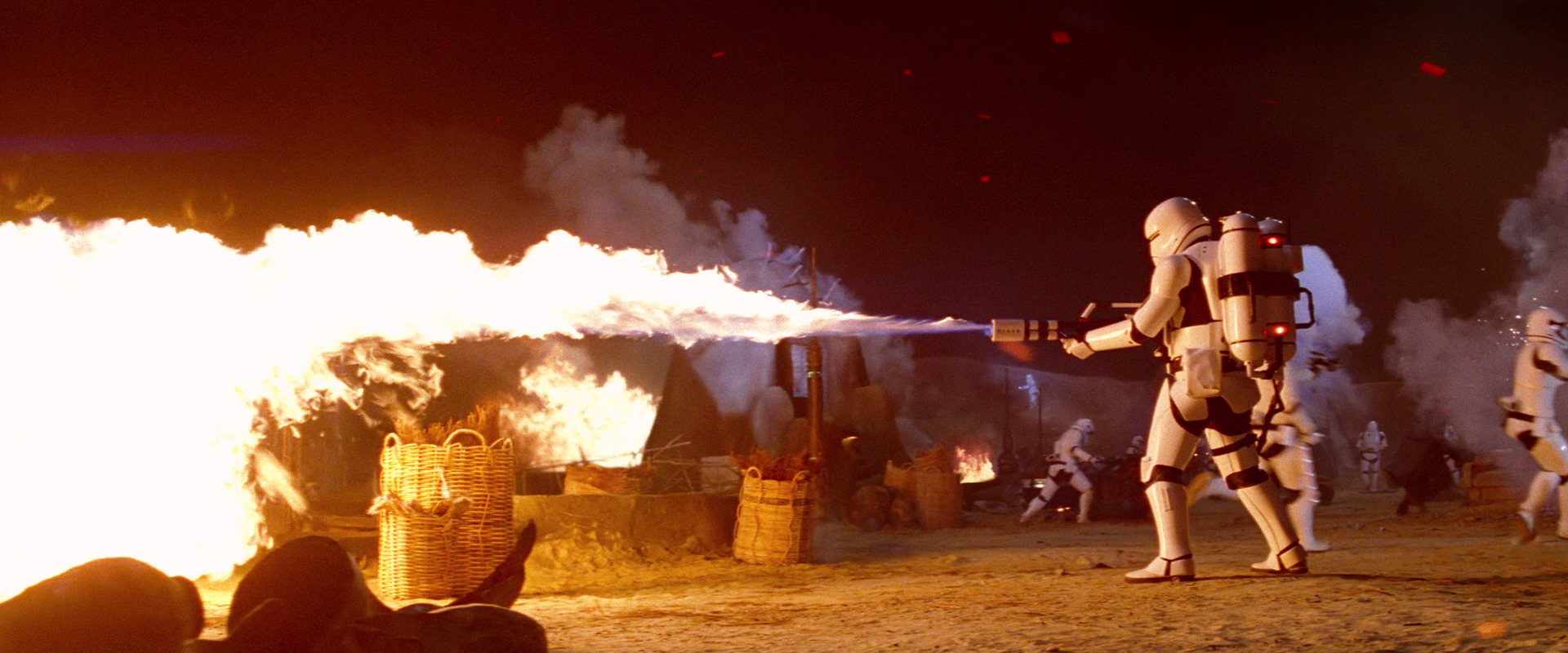
These aren’t the plot beats you are looking for
So let’s look at where the plot points don’t line up.
First – the MacGuffin. The message is different. It’s reason is different. It’s source is different. In fact, one is a message that needs to get somewhere (“Help me, Obi-Wan Kenobi!”) while the other is supposed to be, like, “keep this safe, I’m coming back for it”. The only thing that remains the same is the container. That’s like saying Enemy of the State and Road Trip are “basically the same story” because they both centre on people chasing a video tape. This is what I’d consider a pretty damn superficial similarity because the connections aren’t there on an actual plot level.
So what about Rey’s characterisation versus Luke’s? Luke is raised by family, Rey is effectively orphaned. Luke is a whiny son-of-a-Vader (pending character development), Rey is a monumental badass that can take care of herself. Luke hates Tatoonine and wants out as soon as Forcing possible, Rey is the only one who wants to go back to Jakku. Luke jumps at the chance to be trained in the Force, Rey almost runs. Luke practically wants to cuddle that lightsabre in bed the instant he lays eyes on it (despite the fact it killed dozens of younglings a few years back) while Rey practically craps herself touching one for the first time. Yes, we’re talking protagonists here, so they’re going to have downtrodden, outsider back-stories (that’s the point of protagonists, as they often double-up as audience surrogates that you need to, ya now, relate to) but as far as protagonists go, they are pretty different in their outlook on life, ability, attitude to the Force, and path to realisation.
Both opening acts are set on desert planets… but Star Wars is famed for its one-environment planets. Besides a couple of moisture vaporators, the architecture on Jakku is markedly different to that established on Tatooine. They are definitely different places. Call-back? Coincidence? Certainly it has that internal consistency that says it’s okay.
But consider a few other cognitive biases at work. Think of the counterfactuals. If it was snowy people would say “Hoth”, and if it was a forest people would say “Endor”. Lava world? Seen it! Ecumenopolis? Seen it! Yeah, JJ, give us something new… Underwater? Seen it! Lushous paradise? Seen it! Is originality too much to ask? Probably, yeah, it is.
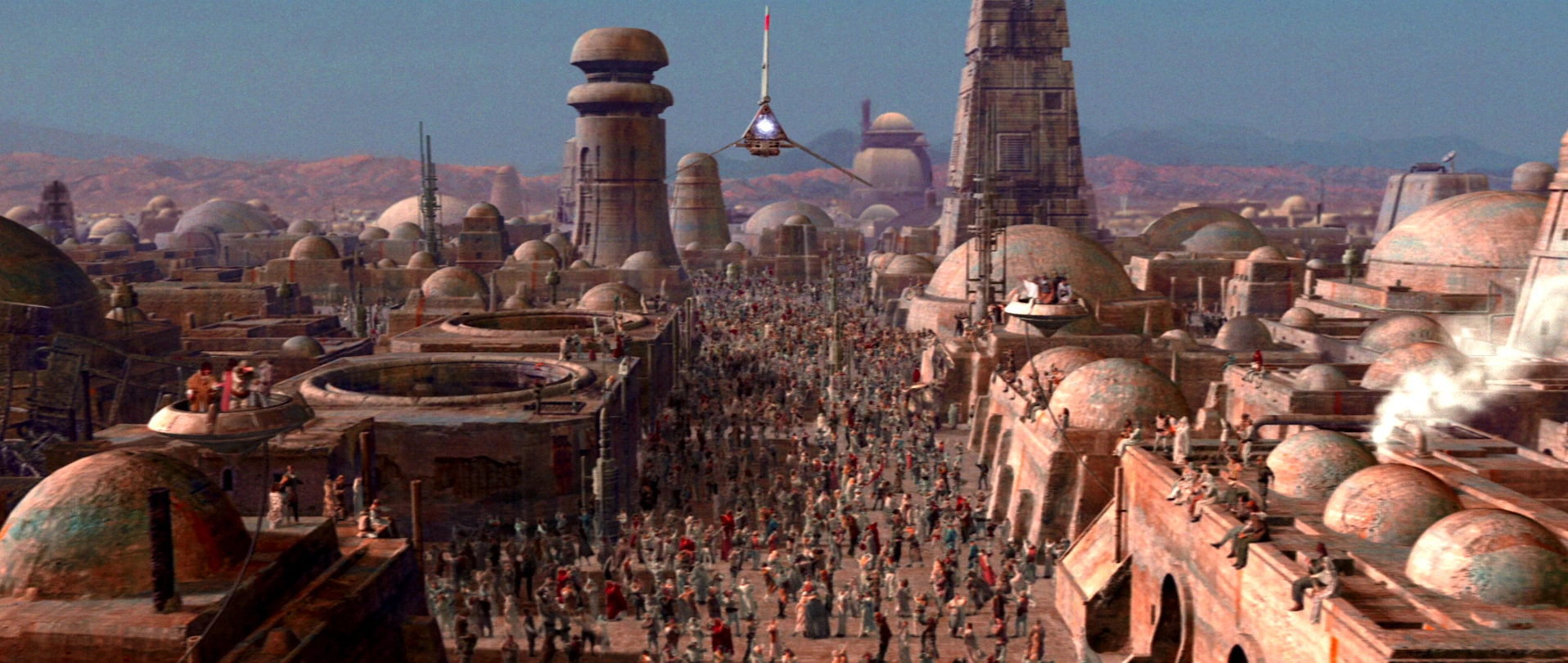
Now, any princesses to rescue? This is a core plot point of Star Wars, yet conspicuously absent from The Force Awakens. The”Finding Luke” thread is a little more Finding Nemo than “Save Leia!” So there’s a major story thread missing from this alleged total rehash.
Trash compactor? That’s a one-liner, not a plot point. Next.
And Finn, because you might not have noticed the black guy, is completely without parallel anywhere else in the series. Nowhere in the Star Wars film canon so far is there a stormtrooper doing the heel-face-turn from drone to protagonist. This is a guy who sees the atrocities committed by the Big Bad, turns away from that, and joins the good guys – albeit with some reluctance and hesitation, and a little bit of self-interest. “Oh, why didn’t JJ give us something new?” you ask? You have literally forgotten the black guy. I mean, dude… that’s not on!
(Oh, for the sort of person who might use “feminazi” non-ironically, implying that you’re racist for forgetting Finn was sarcasm, read the room, guys, read the room, it was only a joke…)
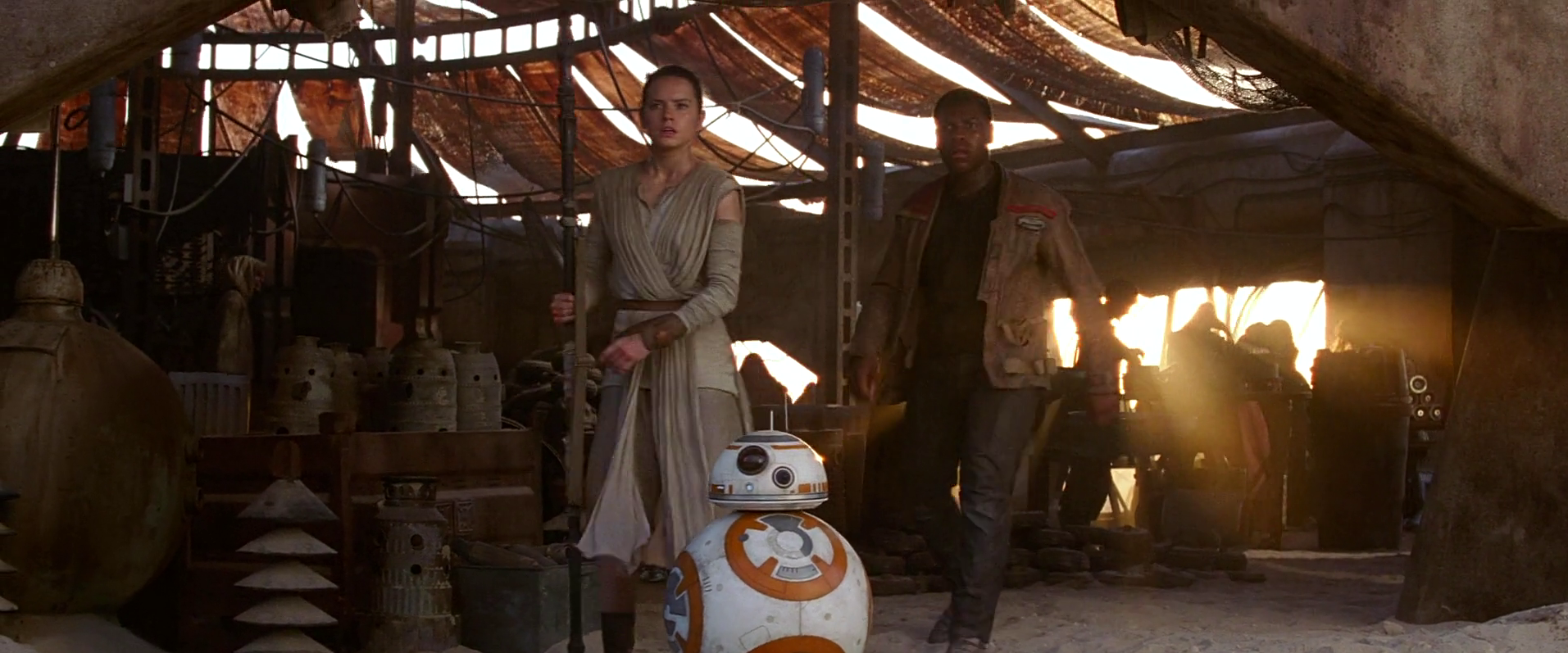
Okay, now on to the Big Bad. In Star Wars, Vader is a stock villain. He’s there to be the Big Bad. That’s it. Actually watch it, and you’ll see he’s just a stock antagonist to give the villains a face to hate. It is, after all, space opera and one big call back to old sci-fi serials from the preceding half century. Remember, Luke doesn’t directly face off against Vader until Empire, and the only direct connection they ever have is Obi-Wan’s story about him. Vader doesn’t have any true purpose in Star Wars. Seriously, actually watch it. The driving force of the villain’s plot is Tarkin, not Vader. The mythologising of Darth Vader came afterwards because the character’s initial simplicity made him iconic. Meanwhile, in The Force Awakens, Kylo Ren is an actual character already. He has plot. He has development. He has a point and a role to play. He actually faces off against the protagonists a few times. He is being built up from the beginning to be more than just the Monster of the Week as Vader might have been if things had been different (and as most of the prequel villains were).
So, the Rebellion is introduced later on in Star Wars – a change from the original script that resulted in Biggs getting written out but bizarrely turning up later – and, of course, the Resistance turns up at the exact same point in The Force Awakens. But in the former it’s a sedate affair “Oh, let’s travel to the rebel base! Cue some soaring forest-moon music!”, while in the other it’s a little more guns-blazing and X-Wings and lasers and stormtroopers and holy shit that sequence was awesome and I can no longer type over the sound of my throbbing (that’s enough, Ed.) Anyway, the time-location in the story is similar; the execution, means, and pretty much everything else is completely different. There is no real deep connection here apart from “now is a convenient time to step things up to the next level”. Find a film that doesn’t do that, and it’ll probably only have about 2 stars on Netflix.
What about the main character’s awakening to the Force? Well, quite. But if you want to use something as vague as the main protagonist having a sudden realisation and getting to grips with the Force – and it’s a freaking Star Wars movie, remember – then pointing out that one is in an X-Wing while the other is in a lightsabre fight should be enough of a specific difference to trump that hososcope-style similarity. As I said, this is a freaking Star Wars movie – this is going to happen. It can’t not happen. If it didn’t happen, it would be terrible. You may as well say they’re “basically the same” because they both have “Star Wars” in the title and both have opening crawls. I mean, come on, here, do you want Iron Man 4 to break new ground by not actually featuring Iron Man?
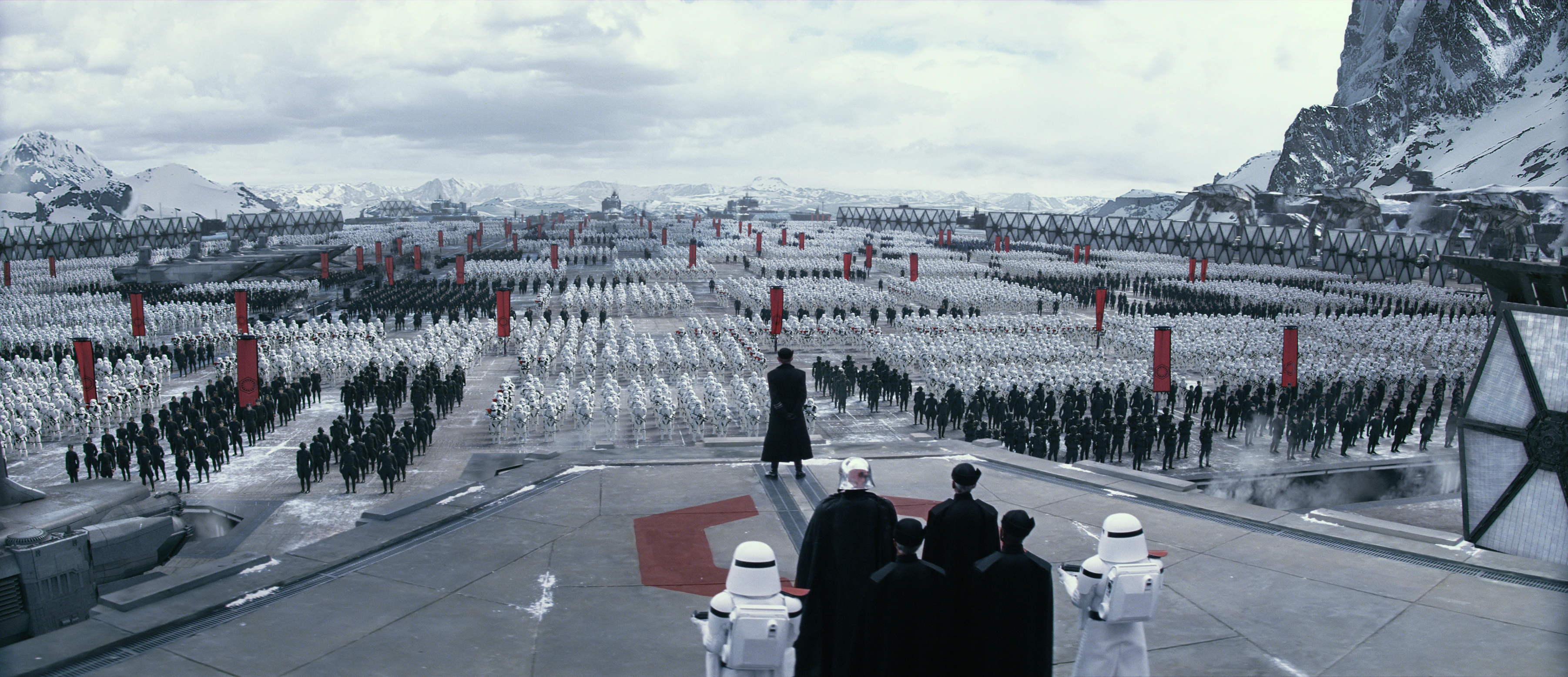
Keep going… Blowing up the bigger Death Star at the end? See above regarding internal consistency. How else do you end a self-contained Star Wars movie? I mean, come on, about half of them end in massive, screen-shattering bangs.
Now, you can say that there’s a call-back to the trench run, but that’s a very superficial visual similarity – as a plot point (and this is “basically the same story”, not “basically the same look”) it is markedly different. There’s tension in the Death Star trench run (unmatched in cinema, I feel) that isn’t present in the X-Wing fight in The Force Awakens. That’s because the real finale is the lightsabre battle – the protagonist and the antagonist are duking it out elsewhere. The build-up and tension have lead to that, so we care a little less about the B Plot. In fact, that’s quite interesting – blowing up the Death Star is the damn B Plot because there’s so much more going on in that lightsabre fight. The sides aren’t evenly matched. The stakes are high. The villain is pissed. The heroes have just seen… well, I’ll get onto that… and so on. We don’t know how that fight will pan out because it’s virgin territory for the heroes. Meanwhile in Star Wars, they are experienced fighter pilots going in there. We feel the tension because they know what’s coming, they have the experience to figure that out. And this is supposed to be the same story?
There’s a little bit of a similarity if you assume the end of the trench run is effectively a duel between Vader and the fledgling Luke… but the characterisation is very different between the films. Luke was always enthused to the Force from the minute he talked to Ben. Rey was hesitant. Vader is the calm and collected Sith, Kylo Ren is the angry teenage Dark Jedi. Vader wants Luke dead. Ren wants to take Rey as his apprentice. I am literally describing different things here. And it’s a freaking Star Wars movie – we’re going to see a good v. evil duel. It has to happen. We’re not going to go three more movies without it happening. The similarities amount to “it’s a Star Wars movie”, while the differences add up considerably.
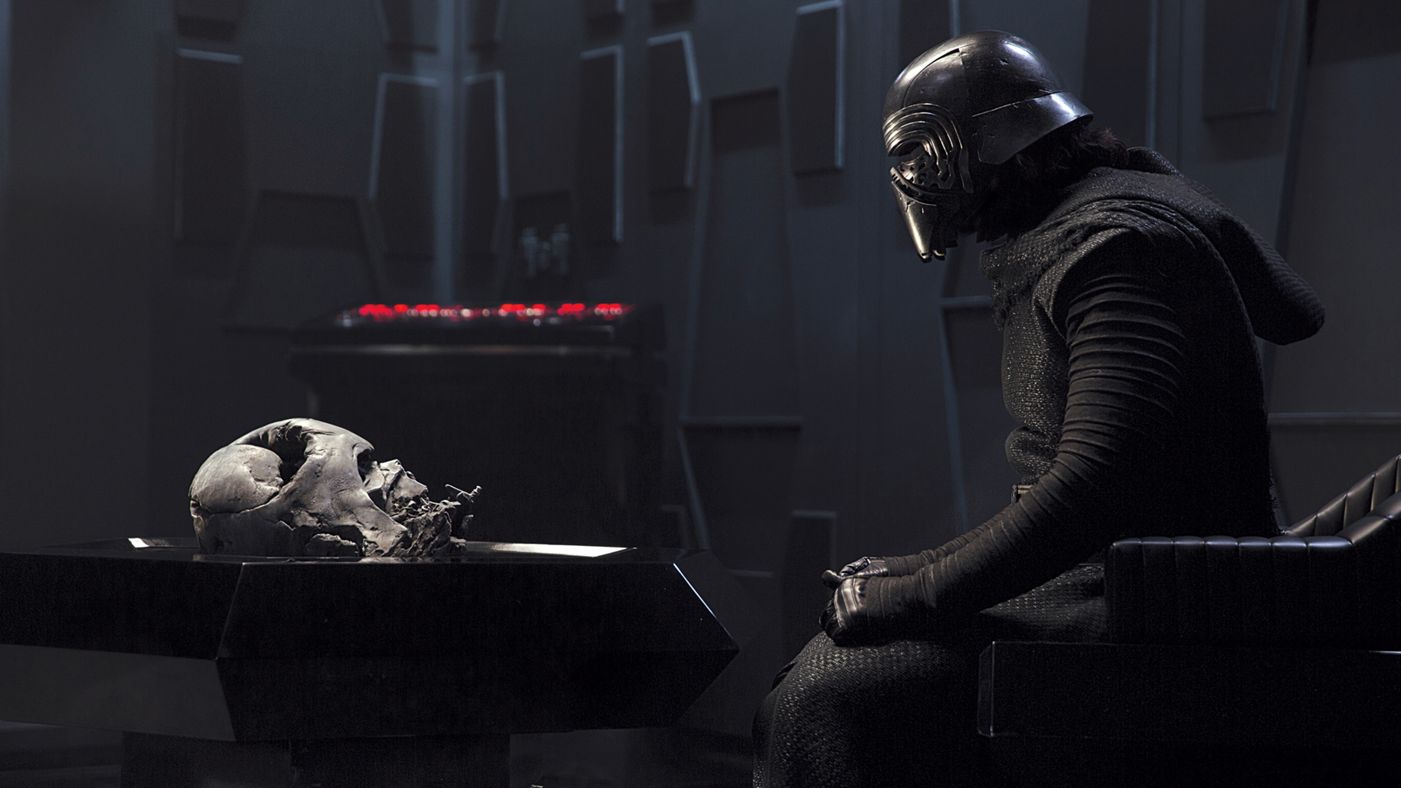
Now, the Big One. Obviously, Han’s death is meant to echo Obi-Wan’s. The old mentor gets it in the neck from the Big Bad. The protagonists are inspired by it.
I’ll take that, but should point out that it’s an internally consistent echo, and doesn’t exist solely as a forced meta-narrative, as seen in much of the call-backs and “it’s like poetry, it rhymes” of the prequels.
At this point, the “basically the same story” crowd are up to about as many plot beats as it shares with a half-dozen other films. But let’s reconsider the differences with this one – otherwise we’re back to claiming that this character death is equivalent to every other character death in cinematic history. First, the plot beat is in a completely different position in the film: Ben Kenobi’s death rounds off the Death Star / second act sequence in Star Wars, Han’s is integrated into the final sequence on Starkiller Base (the lowest-ebb beat that takes the place of Ben’s death comes at Maz’s place a little earlier). Ben kills himself with the Force – hence the disappearing – while Han is actually killed with physical violence. One was the noble sacrifice, the other definitely was not Han Solo’s Plan A. One follows a protracted fight between old enemies, the other follows on from emotional turmoil between father and son. One is combat, the other is practically assassination. In one the villain is pretty villainous about it, in the other has a much more complicated reaction – Kylo Ren practically tears himself apart killing his father. The differences are stacking up so much here that you may as well say it’s ripping off every mid-finale death ever. Hell, Han Solo’s death is probably closer to Dumbledore’s in every respect from timing to execution. Yes, it’s “basically the same story” as Harry Potter.
And a long time ago, in a Facebook status update far, far away…
Yeah, so this got away from me… as always…
To sum up… you have to realise that there are two human biases we need to consider here. Firstly, we’re practically hard-wired to treat negativity as synonymous with intelligence. Hence negative reviews of The Force Awakens are going to naturally resonate with people as poignant and perhaps realising something the great unwashed don’t. And that’s fine, those opinions are valid. But because of that slight bias, we need to make sure that “it’s basically the same story” comes without cherry picking – and I don’t think it does. I think the similarities are superficial at best and so selective as to be meaningless. The echoes are driven by the plot, not the other way around.
Secondly, we’re also very good at matching patterns. We see similarities everywhere. That’s why TV Tropes exist – as a descriptive collection of similarities and patterns in the ideas of storytelling. Put enough movies together and take a far enough step back, and originality begins to look like an illusion. Take a grand space opera – a genre that practically invented those tropes and adheres to them almost by definition – and if you don’t spot the similarities you can consider it a failed space opera. Look at where the prequels attempt to veer off into political thriller territory and see what that achieved.
But, overall, I have to say this: I don’t give a shit if it was even officially an actual, full-on, non-ironic, remake – it was still fucking awesome.

